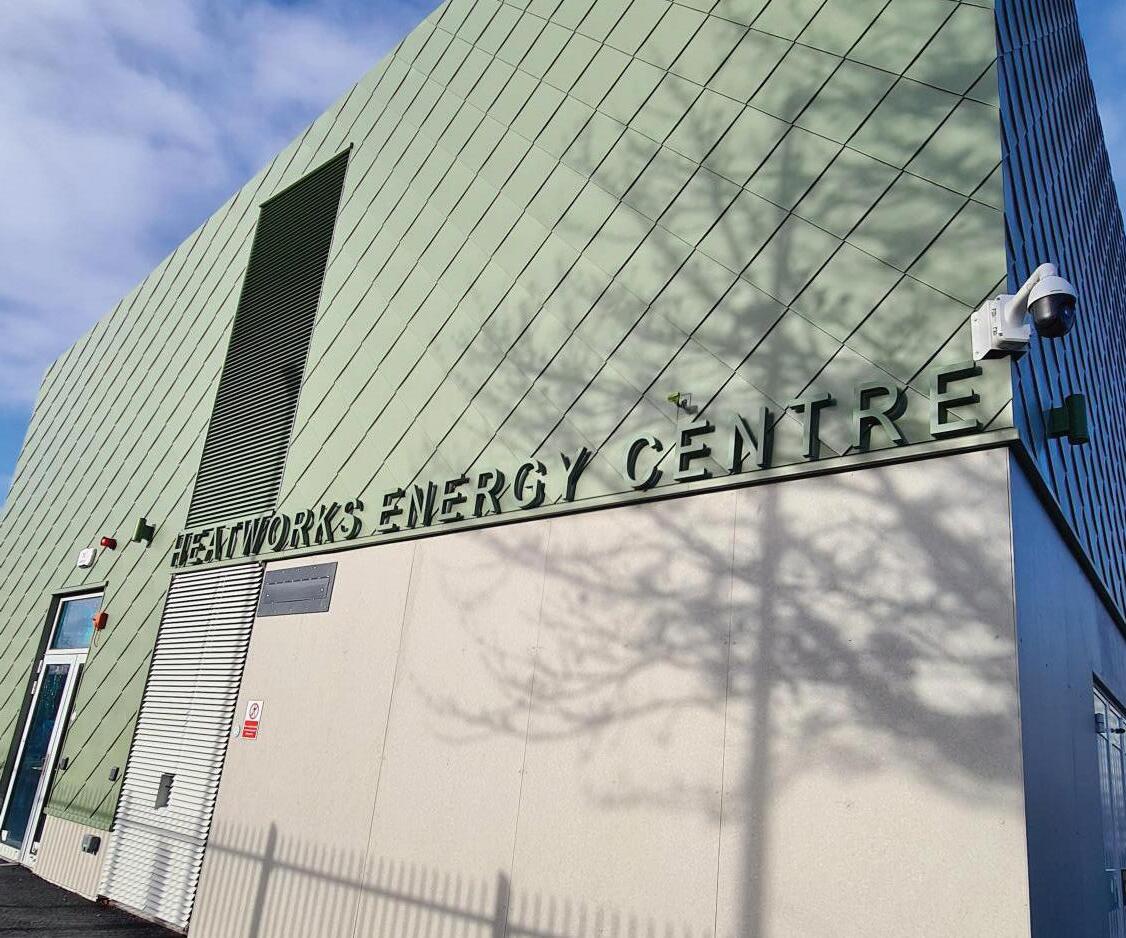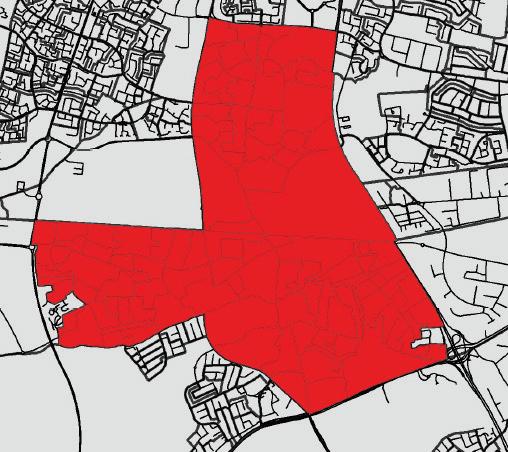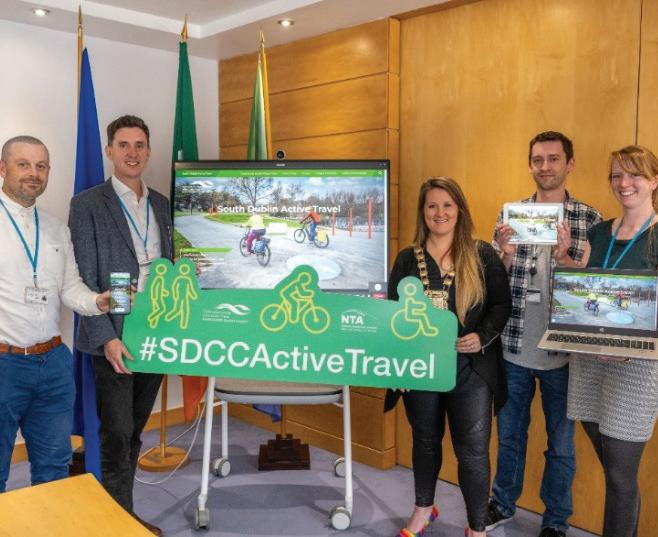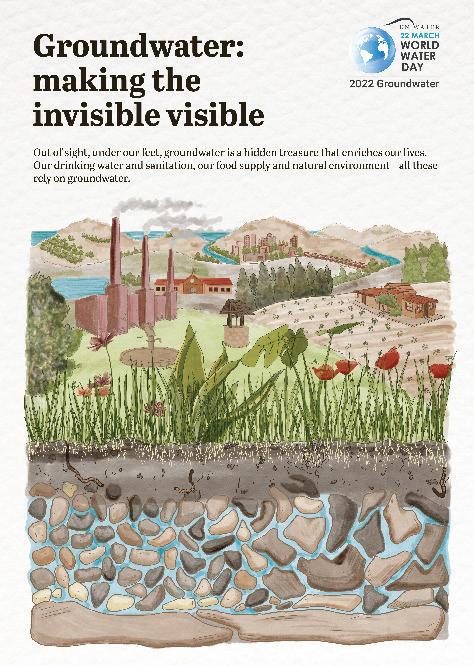
14 minute read
3.0 SDCC CLIMATE ACTION PLAN
SDCC are continuing to work towards achieving the four primary targets of the CCAP. Our energy and carbon emission targets have been revised to reflect changes in National and European legislation since the CCAP was adopted in 2019. Our current targets are;
• 50% improvement in Energy Efficiency by 2030
Advertisement
• 51% reduction in Greenhouse Gas Emissions by 2030
• Make Dublin a climate resilient region by reducing the impacts of future climate change related events
• Actively engage and inform our citizens on climate change
3.1 CLIMATE CHANGE ACTION PLAN KEY ENERGY EFFICIENCY AND CARBON EMISSIONS TARGETS UPDATE
SDCC obtained primary figures from the SEAI Monitoring and Reporting (M&R) database relating to our 2021 energy performance, consumption and efficiency.
In 2021, SDCC consumed 44.3 gigawatt hours (GWh) of primary energy; equivalent to 8,381 tonnes of CO2.
Codema has been entering this yearly data into the M&R system on behalf of SDCC since 2011, in order to comply with the reporting requirements of the European Energy Efficiency Directive 2012/27/EU. The directive has been transposed into Irish Law as Statutory Instrument S.I. 426 of 2014, which sets out several obligations on public bodies with respect to their “exemplary role” for energy efficiency by achieving savings of 33% by 2020. This is an average reduction target of 3% per year.
To date, as reported by the M&R system, SDCC has improved its energy performance by 39.5%, compared to the baseline year (which is an average of between 2006-2008).
3.2 CCAP RETURN TO DECC
SDCC completed and submitted the 3rd annual reporting template of progress on our Climate Change Action Plan 2019-2024 to the Department of Environment and Climate & Communications (DECC). The template tracks the status of each of the original 130 actions and provides an update on progress throughout the reporting period. The template includes the performance dashboard, Figure (3.2.1). SDCC have included 24 additional actions in the 2022 return to DECC. The additional actions are distributed across each of the 6 action areas;
• Energy & Buildings
• Transport
• Flood Resilience
• Nature Based Solutions
• Resource Management
• Citizen Engagement
3.3 TALLAGHT DISTRICT HEATING SCHEME
Construction work on phase 1 of the Tallaght District Heating project was completed in 2022.
The Tallaght District Heating Scheme is being led by SDCC and will operate as Ireland’s first not-for-profit heat utility making a significant contribution to reducing carbon emissions in the area. Annual saving of almost 1,500 tonnes of CO2 is expected in the initial phase of operation. Operating as a Non-profit company, Heatworks will begin to supply heat energy to customers in January 2023.
The scheme will initially heat 47,000 m2 of public sector buildings, 3,000 m2 of commercial space. Buildings heated by this project will include SDCC’s County Hall and Tallaght County Library as well as 135 new Affordable Apartments and the SDCC Innovation Building.
The scheme includes an underground network of highly insulated pipes that transfer low carbon heat from local energy sources to buildings that have connected to the system, will provide hot water and space heating. The nearby Amazon data centre will provide the initial source of heat on the network; however, the scheme can accommodate additional, alternative, energy sources over time.
Phase 1 of the Tallaght District Heating Scheme connects SDCC’s office headquarters and the TU Dublin-Tallaght campus. During normal operation, the heat demand will be fully covered from heat generated at the data centre. The subsequent phases of the project will facilitate the connection of other public, private and residential customers in the Tallaght area. SDCC secured funding of almost €4.5 million for the Tallaght District Heating Scheme through the Government’s Climate Action Fund, as well as support from the Interreg North-West Europe HeatNet NWE project and the Sustainable Energy Authority of Ireland.

3.4 SOLAR PV PROJECTS
3.4.1 SOLAR PV ON SDCC BUILDINGS
Reducing our dependency on fossil fuels is fundamental to our CCAP as we progress towards a zero-carbon society. Meeting our demand for sustainable/renewable energy to heat and power our buildings and facilities will challenge us. SDCC are continuing to investigate potential sources of renewable energy including Solar PV (Photovoltaic) at our facilities.
SDCC has commenced a review on the potential of installing PV panels on the roofs of our buildings, including depots, community centres, libraries and leisure facilities with an appraisal of the roof areas and potential PV capacity and a comparison of the current energy demand profile of each building.
Where feasible locations are identified, a review will be undertaken to identify available funding streams and suitable forms of contract, with an assessment of the most favourable procurement options available.
3.4.2 ARTHURSTOWN LANDFILL
A detailed appraisal for phase one of the Arthurstown Landfill PV project, to investigate the potential to install a small/medium scale solar PV plant to meet the energy demand of the landfill site, has been completed for SDCC by the Dublin Energy Agency, CoDEMA. The site currently treats approximately 30m3 of leachate per day, and over the next few years this is expected to drop and remain steady at 15m3 for the following decade. The energy demand at the site is currently scheduled to maximise benefit from lower night-time rates. The appraisal investigates the optimal size and layout of an array required to match the base load of the plant and includes a cost benefit analysis looking at potential options, along with a project risk assessment.
Phase two of the project will include a feasibility study into the potential to develop a commercial 5 MW renewable energy PV project on the site.
2021 and 2030, and thereafter to achieve net zero carbon emissions by 2050.
Action 165 of the National Climate Action Plan requires identification of one location or area in each local authority that would be subject to a plan for a Decarbonising Zone.
Each LA was required to identify a DZ by 30th, April 2021 with a broad outline of the main projects that could be implementable in the zone plus an indication as to potential outcomes deliverable in terms of reductions in carbon emissions. At a minimum, these outcomes were to be capable of meeting the Government’s targets for carbon emissions reductions set out below, specifically an average 7% per annum reduction in overall greenhouse gas emissions from 2021 to 2030 (a 51% reduction over the decade).
Decarbonising zones should, after initial baseline analysis and stakeholder mapping, set the chosen zones on a path to achieving the greenhouse gas emissions reductions required by Government over by 2030 years.
In April 2021 SDCC submitted a proposal including both Clondalkin and Tallaght as potential Decarbonising Zones to the DHLGH. In selecting potential DZs, SDCC examined towns and villages that fulfilled the basic requirement of a population more than 5,000. It was agreed that to achieve the annual targets of 7% reduction in GHG emissions, a broad range of solutions aimed at the sectors with the highest CO2 emissions would present SDCC with a roadmap towards achieving these targets. SDCC also recognised the importance of considering vulnerable stakeholders in any proposals and ensuring a just transition towards carbon neutrality for all our citizens.
The proposal included a review of the opportunities and obstacles towards achieving the reduction in CO2 emissions for each location, and an outline of potential projects that would have the greatest impact on reaching the targets.
In 2022 SDCC decided to proceed with both locations as Decarbonising Zones.
The four DLAs engaged CoDEMA to develop Decarbonising Zone Implementation Plans. This project has commenced and by Q.1 2023 an initial draft is expected which will include
• Establishing Baseline Data
3.5 DECARBONISING ZONES
In February 2021, the Department of Housing, Local Government and Heritage issued a circular on Decarbonising Zones to enable Ireland to meet its EU targets of reducing carbon emissions by 30% between
• Project potential increases in CO2 emissions
• Gap to Target Analysis
• Register of Opportunities
• Cost Estimates
3.6 ACTIVE TRAVEL
3.6.1 CYCLE SOUTH DUBLIN
The Cycle South Dublin Programme (CYSD) has now been in place for over 16 months. There are currently 21 live CYSD projects, many of these will be completed between 2022-2023 whilst others have a later projected completion date.

Several significant projects are expected to progress to Part 8 planning later this year, including Wellington Road Cycling and Walking Scheme and Section 5 of the Dodder Greenway.
Substantial progress has been made on CYSD schemes in 2022, adding significant public cycling infrastructure in South Dublin and making cycling and walking preferred options for shorter journeys for work/leisure and school.

Over €18M was received in allocations for SDCC schemes in 2022. The expenditure in 2021 was €10.8M.
3.6.2 ACTIVE TRAVEL
The Active Travel team have gone to tender on Phase 2 of Bicycle Parking and will be installing Bike Shelters alongside standard Sheffield Style Adult and Junior Stands.
Applications for bicycle parking are also being accepted again from Sports Clubs and Schools. SDCC are working to complete bicycle parking at 9 of our public parks. Later in 2022 SDCC will go out to Tender again and look at different solutions for Bike Parking that includes Cargo Bike Parking, Bike Shelters and E-bike Solutions. It is expected that by the end of the year, over 800 new bicycle parking spaces will have been provided by SDCC.
SDCC Active Travel team launched their dedicated website on the 27th July, 2022. www.sdcc.ie/en/active-travel/
The website will provide updates of ongoing projects, links to cycling route maps and information on the benefits to be gained through active travel.
3.6.3 ESB E-BIKE PILOT PROJECT FOR DUBLIN COMMUTER HUBS
In 2022, SDCC Climate Action Team facilitated ESB with the installation of an innovative public e-bicycle hire pilot project. SDCC assisted ESB to identify suitable location on public property to pilot the project.

The project was launched by ESB On 17 August 2022. The project is operated in conjunction with the 4 Dublin Local Authorities, 2 of Ireland’s micro-mobility providers (Bleeper and Moby), research partner Trinity College Dublin, innovation partner Dogpatch Labs and co-funding partner Interreg North-West Europe,
The pilot programme, ESB e-Bikes, will initially run for a 10-month period providing 112 electric bikes with 14 charging stations at locations along Dublin’s busiest commuter spine.

Bleeper and Moby will maintain and operate the e-Bikes with the charging infrastructure provided by ESB. The scheme will be accessible via the ESB e-Bikes app.
This project is included as part of the broader Interreg North-West Europe e-HUBS programme. Dublin will join other member cities, such as Amsterdam and Manchester. Interreg North-West Europe (www.nweurope.eu) fosters transnational cooperation to make North-western Europe a key economic player and an attractive place to work and live, with high levels of innovation, sustainability, and cohesion.
Trinity College Dublin, as research partner, will review and analyse commuter behaviour in relation to e-mobility, transference from private cars to a shared low-carbon travel solution, to identify key mobility patterns, to calculate carbon savings, and to evaluate commercial potential based on data collected from ESB e-Bikes. TCD will publish academic papers detailing the scheme’s carbon savings along with its key learnings. Lessons from the project will be available to future sustainable mobility projects
Additional information on the pilot project can be found at www.esb.ie/ebikes
Locations of E-bike hubs in South Dublin:
• Old Bawn Road, Tallaght, Dublin, D24
• Saint Loman’s Road, Yellow Walls, County Dublin
• St. Peter’s Road, Walkinstown, Dublin, D12
• Firhouse Road, Tallaght, County Dublin, D24
3.7 SUSTAINABLE ENERGY COMMUNITIES
SDCC continues to support the Sustainable Energy Authority of Ireland’s (SEAI’s) Sustainable Energy Community (SEC) programmer. SDCC has co-signed a Memorandum of Understanding with SEAI for the provision of bridging finance to facilitate communities to develop Energy Masterplans up to the value of €30,000 under the Sustainable Energy Communities programme. Costs for developing approved Energy Masterplans is fully recoupable from the SEAI.
The Knocklyon Network group was established in 2010 have been active participants in the SEC programme since 2018. Their successful pilot project is showcased on the SEAI SEC website.
Clondalkin SEC are preparing a submission to the SEAI for approval for funding to develop an Energy Masterplan.
Sustineo, the appointed mentors and advisors to the SEC programme in South Dublin are currently working to recruit additional groups. Recruitment events were held throughout the year including at Dublin Climate Action Week Climate Festival in Tymon Park on the 17th September.
A framework of energy consultants has been prepared for the Dublin Region to work with communities and to develop Energy Masterplans.
3.8 GREEN PUBLIC PROCUREMENT (GPP)
The Climate Action Charter for Local Authorities calls for the implementation of green public procurement across all business areas. To support this action SDCC established a Green Procurement Working Group. The group was set up in February 2022, with responsibility to oversee the progression of
1. The green procurement objectives outlined in the Corporate Procurement Plan 2021-2023
2. The implementation of the EPA Green Public Procurement Guidelines 2022 for the 10 priority sectors identified
3. Work towards the Programme for Government commitment of implementing green public procurement (GPP) in all tenders using public funds by 2023.
The Working Group prepared an Action Plan to achieve its objectives.
4. To investigate opportunities where green procurement can best add value.
5. To explore opportunities for the inclusion of the EPA Green Public Procurement Criteria for upcoming procurements in the 10 priority areas. The group will support contract managers in including EPA criteria in their tender competitions and will provide an opportunity to share learnings.
6. To examine opportunities to reduce the environmental impacts of existing supplies and services contracts in place; and to work with and support the relevant contract managers in delivering proposed solutions.
7. To explore opportunities for a pilot for the inclusion of green procurement criteria/ criteria that reduce the environmental impact where there is a clear link to the output / outcome delivered in a works / works related contract(s). The group will support the contract manager(s) as appropriate and will provide an opportunity to share learnings.
8. To identify and share best practice examples of green procurement.
9. To identify any supports required to successfully progress the implementation of green procurement in SDCC.
10. Implement a means of monitoring outcomes of the Green Public Procurement Working Group’s Action Plan
11. Support the delivery of the procurement targets within the Local Authority Climate Action Charter which was signed by all local authorities in November 2019.
A series of GPP training courses have been developed under the ‘Actioning Policy’ Pillar of the Local Authority Climate Action Training Programme as a collaboration between CARO, LASNTG, LGMA, Regional Waste Office, Local Government Operational Procurement Centre, EPA, OGP and local authority procurement staff and budget holders in counties Mayo, Galway City, South Dublin, Laois, Meath, Kildare, Waterford and Fingal. Training is delivered by Greenville Procurement Partners Ltd. through their online learning platform with the core objective of building awareness and empowering staff to use green criteria in their tendering and purchasing processes.
To date, the following GPP Training has taken place:
• Strand 1 – GPP Awareness Webinar (45 minutes). Over 450 colleagues from across all 31 LAs have completed this training.
• Strand 2 – Implementing GPP (3-day training programme).
• Strand 3 – GPP Strategy (1 day training programme)
This staff training will be complemented by supplier briefing sessions that are being organised by the Green Procurement Working Group. The Working Group, in partnership with the South Dublin Local Enterprise Office and the other Dublin Local Authorities, intend to hold these briefings in Q4 2022/Q1 2023.
3.9 COMMUNITY CLIMATE ACTION FUND (CAF)
In line with EU ambition, Ireland has committed to achieve an average 7% per annum reduction in overall greenhouse gas emissions between 2021 and 2030.
The Department of Environment, Climate and Communication (DECC) undertook a consultation process in 2021 with over 4,700 contributors, to assess the views of citizens on how the country could make the necessary transformation, and to establish supports for individuals and communities to progress their own positive climate actions and ambitions.
The outcomes from the Climate Conversations highlighted a clear indication that citizens want to do more to step up local climate action and that they need support for this local activation.
In response, the Minister launched the Community Climate Action Programme, which will see €60m from the Climate Action Fund invested in community climate action projects and initiatives, and capacity building over a period of 3 years.
The Programme has been developed under 2 strands addressing both direct climate action, and climate education and capacity building. An initial €30 million is being allocated over an 18-month period for 2 strands as follows:
• Strand 1- Action: Building Low Carbon Communities - €24 million is being provided to local authorities to partner communities, within their areas of operation to build low carbon communities in a considered and structured way.
• Strand 2 Education: Climate Education, Capacity Building and Learning by Doing – €6 million is being provided to Pobal and the Creative Ireland Programme to build community capacity to undertake and step-up climate action. The focus of this strand is on education directly leading to action as opposed to awareness education.
DECC has agreed with the CCMA that 12% of the €24 million allocated for Phase 1 of the Programme may be assigned for administrative purposes towards the cost of resourcing a Community Climate Action Officer (Grade 6) in each local authority to oversee the Programme. The Department will provide at least the same sum for administrative purposes under Phase 2 of the Programme. This will ensure that a total of at least €5.76 million will be provided over a 3-year period towards the cost of a Community Climate Action Officer in each local authority.
3.10 WORLD WATER DAY
On Tuesday March 22nd SDCC joined organisations and groups across the globe to recognise World Water Day 2022 and to acknowledge the value and vulnerability of our most precious natural resource. SDCC availed of the opportunity to run a public information event in the at County Hall, Tallaght raise awareness and present information on current water management and protection projects in South Dublin. The Mayor of South Dublin recorded a video clip for social media. The theme of World Water Day 2022 was Groundwater.

Our information event had representatives from
• Local Authority Water Programme (LAWPRO)
• Dublin Urban Rivers Life project
• Sustainable Drainage Systems Guidance team

• Flood Alleviation Schemes (Poddle, Camac and White Church)
Amongst our many visitors were representatives from Friends of the Camac and from Knocklyon Sustainable Energy Community.
3.11 POLLINATOR AWARDS 2022/2023
SDCC were delighted to announce that Tymon Park has won the prestigious 2022/23 Pollinator Award for the Best Town Park in Ireland as part of the Green Flag scheme.
The Pollinator Award is jointly run by An Taisce’s Environmental Education and the National Biodiversity Data Centre. The award assesses the pollinator-friendly management of parks against the recommendations of the All-Ireland Pollinator Plan.
Over the past number of years SDCC have significantly increased the area of natural meadows in parks and open spaces across the county including in Tymon Park. Tymon Park has over 41 ha (100 acres) of long flowering meadows with 160 ha (395 acres) county wide.
As well as managing the meadows and carrying out survey work to ensure the management is effective Public Realm have been actively communicating their efforts to the public using video updates of the work that being undertaken and highlighting the importance of these actions.

In addition to this award, SDCC has also been presented with 5 Green Flag Awards from An Taisce’s Environment Education Unit. Waterstown Park, Sean Walsh Park, Tymon Park, Corkagh Park and Rathfarnham Castle Park all achieved Green Flags Awards. The Green Flag Award scheme aims to encourage the provision of good quality public parks and green spaces that are managed in environmentally sustainable ways. The Green Flag Award Scheme encourages high environmental performance and good management. Parks and green spaces are judged against 8 key criteria.
SDCC acknowledges the parks staff, the Council’s Heritage Officer and all of the community volunteers and residents’ groups who continue to play an active role in parks around the county and whose hard work and dedication contributed to these awards.


